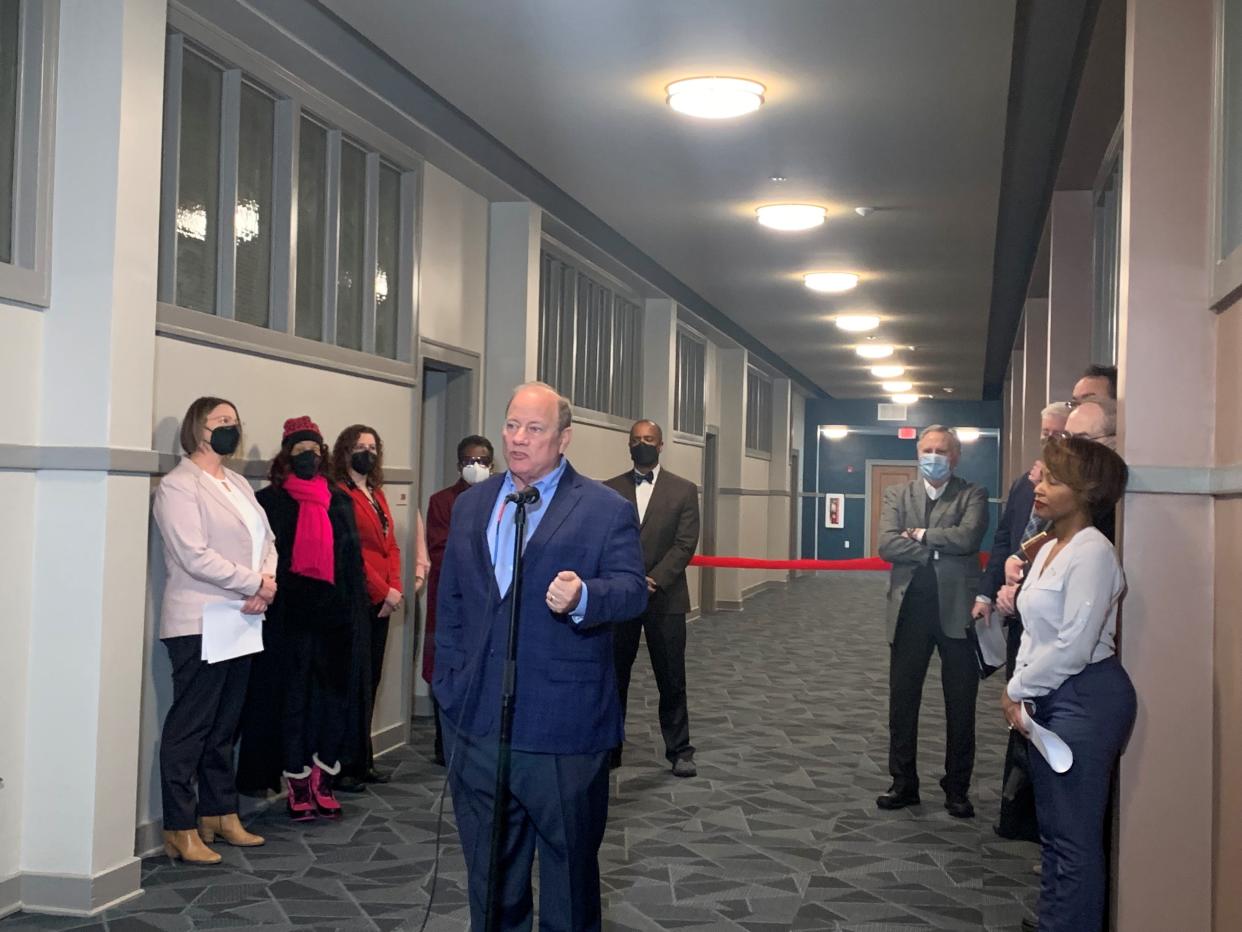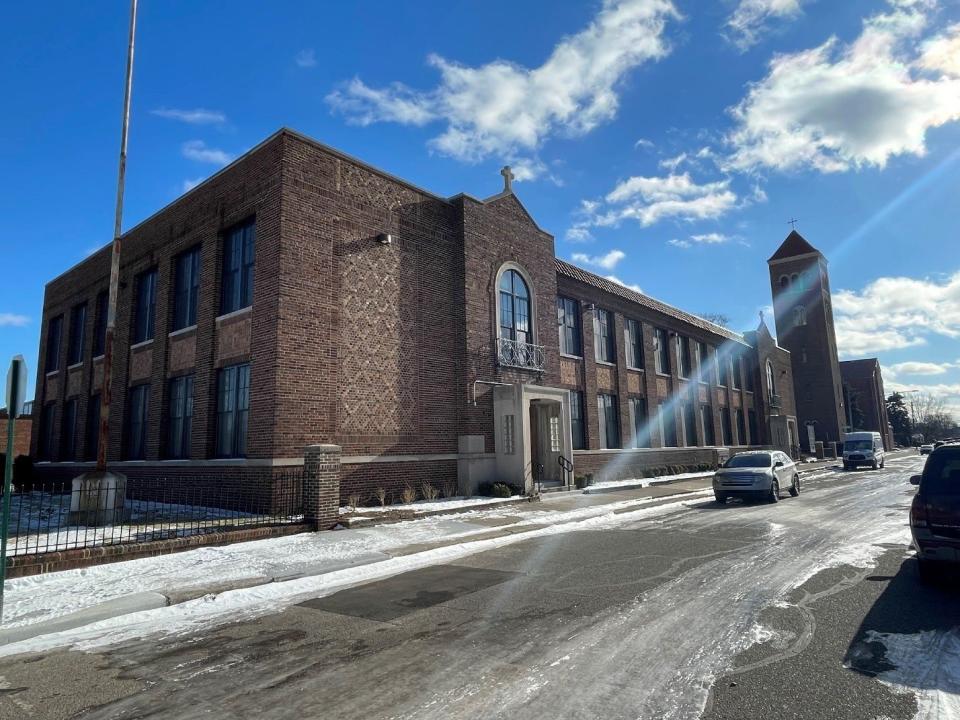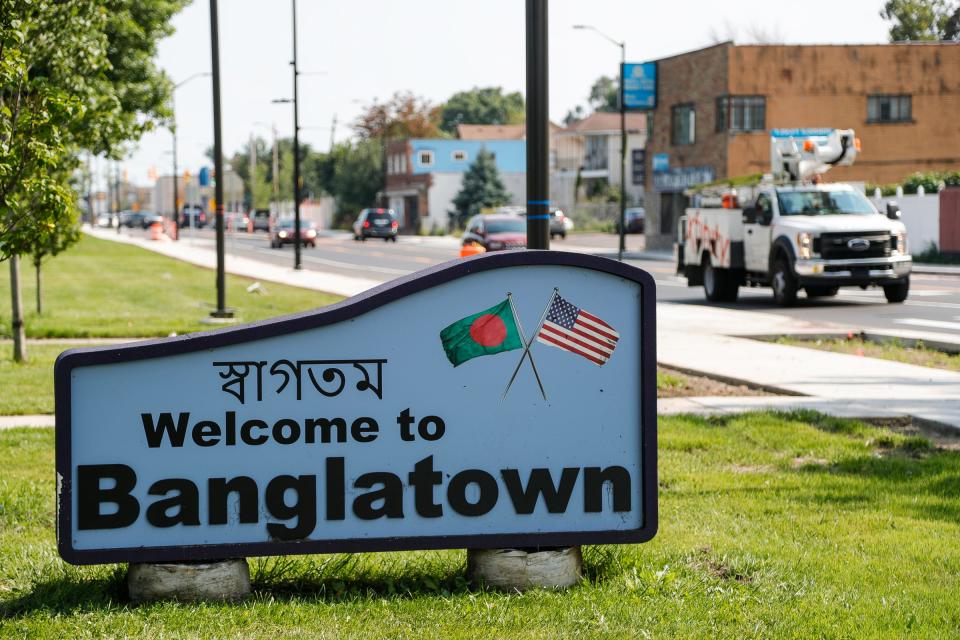Ex-Catholic school in Detroit gets $7.2M renovation, transformed into affordable housing

A $7.2 million renovation has turned a former Catholic school in Detroit's Banglatown neighborhood into housing.
City officials and developers marked the opening Monday of the Transfiguration Place Apartments, named for the former Transfiguration School, where its 19 units are for individuals making $28,000 or less, and who will not pay more than 30% of their income on rent and utilities.
The 21,500-square-foot building at 13300 Syracuse near East McNichols includes 17 one-bedroom apartments and two two-bedroom units. Built in 1926, the former school also served as a church until 1950. It's been vacant since 2014. It is the oldest surviving part of a complex added to the National Register of Historic Places in 2019.
"No longer an educational fixture in the community, Transfiguration is an adaptive reuse at its best. Its scale fits the surrounding landscape, and its use as housing for families fits well in the neighborhood," said Sandra Henriquez, CEO of the Detroit Housing Commission during the Monday ribbon cutting. "Much as the former school was an anchor in this community, this housing can now serve that same purpose."
More: Long-vacant beauty Lee Plaza set to be restored, will feature senior apartments
More: Detroit housing fund raises $65 million. Here's a list of the projects so far
Rent is expected to be $815 for the one-bedrooms and $1,049 for the two-bedroom units. The income-eligible residents will receive vouchers from the Detroit Housing Commission so they aren't paying more than 30% of their income on rent. This will last 20 years, Henriquez said.

The developers are Detroit-based Ethos Development Partners and Cinnaire Solutions, in Lansing. In 2017, the city began working with the Archdiocese of Detroit to find a developer.
"We were in a neighborhood where people are coming back, property values are rising quickly, rents are rising quickly and there was a risk of longtime residents" being pushed out, Detroit Mayor Mike Duggan said, and in the middle of it was an abandoned school.

The project received about $1.9 million in Michigan State Housing Development Authority low-income housing tax credits, $1 million in federal historic tax credits, along with $1.4 million in federal HOME investment partnerships grants and $750,000 in community development block grants through the city's Housing and Revitalization Department.
"We know that adaptive reuse can have major impacts in neighborhoods — we've seen that downtown with many formerly vacant buildings now being centers of activity," said Julie Schneider, director of the city's Housing and Revitalization Department.

Victoria Griffin walked the halls of the school in her youth. She remembers the cafeteria and the gym.
Griffin, 51, lives just 2 blocks away and has been a part of the neighborhood her entire life. The transformation of the building is a "milestone," she said. Griffin hopes the housing will stay affordable in the future and that more abandoned schools will be similarly renovated.
"This is a revitalization of my community. I grew up here as a child, I stayed here. People kept telling me, 'Why do you live in Detroit? You don't need to stay in Detroit. You should leave Detroit,' but I love Detroit. And I'm an example of when you stay and you fight, you can make a difference in your community," she said.
Detroit's Campau/Banglatown neighborhood — which sits near the Hamtramck-Detroit border — is home to a diverse population of African American, Yemeni, Polish and Bosnian residents. The area also has a large Bangladeshi immigrant population, and a number of businesses line the commercial corridor, Conant Avenue.
Roughly half of the residents in and around Banglatown were born outside the United States, according to a report last year from Global Detroit, which studied the area and surrounding neighborhoods. Rapid immigration growth has contributed to retail business growth and housing stability, researchers found. Sixty-three percent of residents in the area were homeowners, compared with 47% in the city as a whole.
"This just shows what it takes to build quality, affordable housing in our neighborhoods — something we're not seeing that often, but we're seeing more and more now in the city of Detroit," said Detroit City Council Member Scott Benson, whose district includes the Banglatown neighborhood.
Residents who are interested in the units can call the Detroit Housing Commission at 313-877-7864.
CORRECTION: A previous version of this story incorrectly stated a fact about the building that houses Transfiguration Place Apartments. The building is the oldest of the buildings on the former historic Transfiguration School campus. This version is correct.
Nushrat Rahman covers issues related to economic mobility for the Detroit Free Press and Bridge Detroit as a corps member with Report for America, an initiative of The GroundTruth Project. Make a tax-deductible contribution to support her work at bit.ly/freepRFA.
Contact Nushrat: nrahman@freepress.com; 313-348-7558. Follow her on Twitter: @NushratR. Sign up for Bridge Detroit's newsletter. Become a Free Press subscriber.
This article originally appeared on Detroit Free Press: Former Catholic school in Detroit's Banglatown area is now housing

